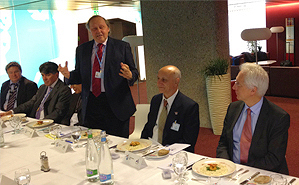Earlier this week the EBU hosted a working lunch on radio spectrum, bringing together representatives of the world's broadcasting unions, other interest groups and leaders of the World Radiocommunication Conference (WRC-12). The event took place on Tuesday, the second day of the the four-week ITU-hosted conference taking place in Geneva.
The conference, one of an ongoing series, endeavours to agree the policies that nations should adopt for using radio spectrum. It is widely acknowledged as the place where the future of world broadcasting takes shape. This year's agenda is full of important issues, some of which may bring changes to the way the television broadcasting bands are used in future.
The working lunch offered participants an opportunity to engage in frank discussions about the relative positions that terrestrial broadcasting and wireless broadband should have in the spectrum that is today used by television broadcasting.
| Spectrum allocation is a thorny issue, since terrestrial television systems are evolving, while demand for wireless broadband is rising fast. The dilemma for the decision makers is how to decide on priorities.The meeting was hosted by EBU Director General Ingrid Deltenre and the Director Technology & Development, Lieven Vermaele.
The EBU's David Wood, in his capacity as Chairman of the World Broadcasting Union's Technical Committee, said the world's terrestrial broadcasting community will argue for adequate spectrum for the evolution of terrestrial broadcasting. All the attendees keenly contributed to the discussion, agreeing that it had helped reach a common understanding. | David Wood speaking during a working lunch at the WRC-12 conference |

